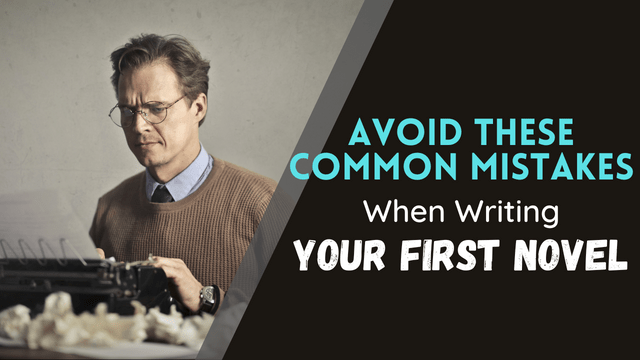Latest Writing Video! |
|
A novel is not an easy project to tackle, let alone complete. There are many challenges along the road, and for a new writer, it’s an especially daunting road too. Some common mistakes can jeopardize your story and make the writing process grueling instead of enjoyable. Here are some common mistakes you could make when writing your first novel and how to avoid them! Pin for Later!1. Not Outlining Your Story Before Starting to Write ItA novel is easy to start with just an idea. Many writers dive into the writing process with just that and a little inspiration. Most are then disappointed by the end of the second or third chapter when they find the story is lacking structure and depth. It all comes down to the lack of outlining. Poor planning, or no planning at all, is one of the first mistakes a beginner writer makes. Often carried away by their burst of inspiration, a writer will throw themselves at a story with too much excitement and not enough foundation to work with. The planning process is crucial if you want to have direction in your story and well-rounded scenes and characters. Those that take the time to plot their entire story are more likely to finish their first draft than those who don’t. When tackling your first novel, the last thing you want is an incomplete story that discourages you from writing. Next time you want to start a novel, give yourself a better chance of completing it by taking a week, or even a month, to write small summaries of each chapter. 2. Lack of Character DevelopmentThe plot isn’t the only thing that develops throughout the story, so do the characters. Too often a writer will establish a character that is already ‘complete’. The character has a personality the writer enjoys, their flaws are more charming than detrimental, and it seems like the story always goes their way, despite some tense scenes. However, this isn’t the way to write an engaging character. An engaging character is flawed and noticeably so. Their problems, their fears, and their weaknesses are presented from the start. The hero always starts off weak in some respect, and it is only through other characters and major scenes in the story that they start to learn and grow. If you want to avoid this common mistake, you need to look at the kind of story you want to tell and introduce a problem that characters need to overcome in order to become better people. For example, in more typical adventures, the protagonist is weaker than the antagonist, so they need to get smarter, learn how to wield a sword, or throw a punch in order to meet the antagonist as equals in the climactic showdown. However, this development can also focus on more internal growth. A character might struggle with an emotional problem, and the events of the story help them come to grips with this problem and grow to accept or defeat it. Whether it be grief, low self-esteem, or a bad moral compass, the protagonist is a different person by the end of the story. The better your character development, the greater the reader’s attachment to the character will be. 3. Weak DialogueMany writers struggle with dialogue, especially beginner writers. Natural dialogue is often lost when a writer has little experience, or they put too much focus on following the plot, or they simply don’t keep their characters’ personalities in mind. Weak dialogue can create flat scenes, ones where the emotional impact is not there. Some dialogue is so mundane that it just comes off as narration with quotation marks. There are many ways to improve one's dialogue, from showing the character's personality to introducing actions to give the scene energy. For a more in-depth look at creating believable dialogue, I recommend checking out my article here on the subject as I give you 7 great tips for engaging dialogue. That being said, one great tip I can give you now is reading your dialogue aloud. By speaking the words you have written, you will have an easier time spotting what works and what does not. The ear is often better at checking dialogue than the eyes, so be sure to give it a shot! 4. Too Much ExpositionExposition is commonplace in every novel. The more unique your world space and idea, the more likely you are to include exposition in your story. Many writers understand that exposition is a poor storytelling technique that we sometimes turn to in order to get a lot of information across quickly. Yet, all understand that sometimes it is unavoidable in a story. A reader sometimes needs that burst of information to help them hit the ground running, otherwise many aspects of the story can be confusing and frustrating. That’s why another technique in stories is to have a main character that is new to all these wonderful or terrifying aspects of the story, so they can learn from other characters, and the reader can learn through them. However, a common mistake when writing a novel is to include way too much exposition. Often, clusters of exposition can bore the reader and it directly goes against the popular writing advice, “Show, Don’t Tell.” Exposition won’t be the downfall of your story, but too much can easily break its flow. 5. Poor PacingPacing is something that needs to be maintained throughout a story. Pacing is the speed at which the story unfolds, and depending on the scene, the pacing can be faster or slower, but overall it should be consistent. A poorly paced novel is not only confusing for the reader, but frustrating. If you want to avoid this mistake, it’s important to pay attention to the rhythm of your story. Be sure that you have a clear idea of the story structure from your planning phase and how each scene should feel. There are also many pacing techniques you can use when writing these scenes such as cliffhangers, tension building, and character development can all be used to keep the reader engaged. I should say that the outline of your story should not entirely dictate your story, it is okay to have some creative freedom with your writing especially later in the story. You don’t want to fly past something important or linger on something mundane. It should also be said that getting another person’s perspective on your scene, or story overall, will help you spot the problem areas in your pacing as well. If you keep this in mind, you should be able to create a satisfying reading experience for your reader! 6. Lack of ConflictI have always said that conflict is important in any story. Without conflict, one struggles to progress the story or develop the characters. Conflict challenges ideas, will test people and it creates an interesting story for the reader to sink their teeth into. A common mistake is to include very little conflict where conflict can be introduced. For example, the standard conflicts are usually established in a simple story, protagonist vs antagonist, one is good and the other evil. However, conflict can arise in any situation between anyone. Conflicts between protagonist characters can often lead to the most character development. Sometimes, the values of a character can only really be challenged by other characters of the same type. When left unchecked, any character can maintain bad habits that can lead to their downfall. This is why it is so common for antagonists to approach conflict amongst themselves in a way that doesn’t lead to development, either through absolute rejection of the notion of weakness or simply through selfish acts. As a result, the protagonist grows stronger while the antagonist does not, which is what makes the idea of the hero catching up to the villain so realistic, even though it is commonplace in most stories. Of course, the same applies to physical conflict. Each fight can make a character stronger if they wish to see it that way. The protagonist will grow by taking fights they don’t know if they can win, but doing so anyway for valiant reasons. However, an antagonist often picks fights they are sure they can win, or flee fights they believe they cannot. Conflict is full of interesting moments and they are important for any great story, and any great character. 7. Overuse of Cliches and TropesSpeaking of common story ideas, let’s talk about cliches and tropes. These are common aspects of stories that are used often in most literature, predictably common in certain genres. If you think you don’t have any tropes or cliches, you need only look at the common story’s high and low points. How many characters have a loved one killed by the antagonist sparking a revenge story? How many stories include unlikely friends who form a bond as the story progresses? And how many stories have a protagonist go down a dark path and turn back before it’s too late? Cliches and tropes will forever be reused in stories, but that is fine. Some of these ideas are so enjoyable and impactful that it would be silly not to include them. At the same time, it’s almost impossible not to include at least one! However, the common mistake is to lean too heavily on these common story ideas instead of making them unique with your own style and ideas. It might seem difficult to do so at first, but once you get more engrossed in your ideas and what you want to see in your story, your instincts can guide you better than your experiences with other stories. By all means, use and acknowledge the cliches and tropes you use, but if you want to write a special story that is still unique, you need to see what you can add to break the formula without breaking the impact of those cliches and tropes. What Next?And there you have it! Some common mistakes writers make and advice for avoiding them. Of course, these are not all the mistakes one can make, but they are some of the biggest.
If you are an experienced writer, what mistakes did you make when writing your first novel and how do you avoid them today? Let me know in the comments below! Thank you for reading and as always, Good day, goodnight, and happy writing!
0 Comments
Leave a Reply. |







